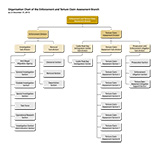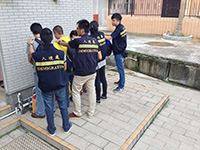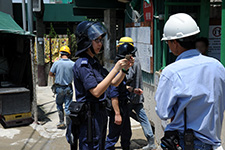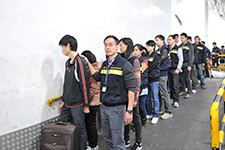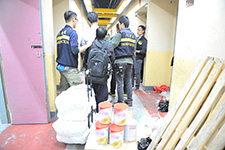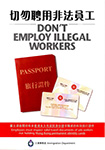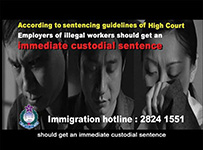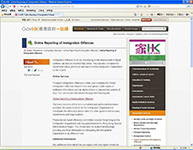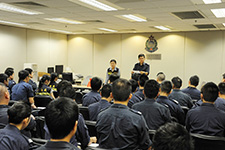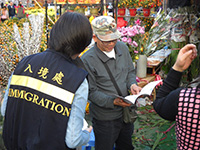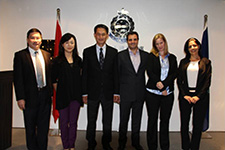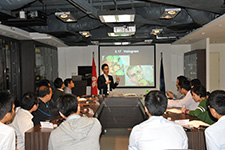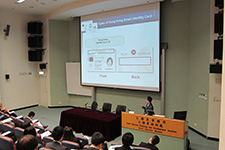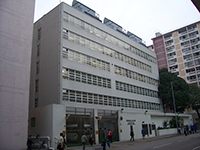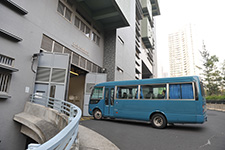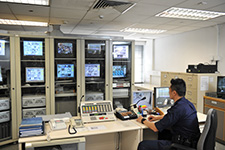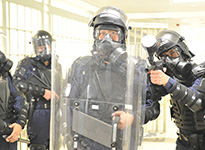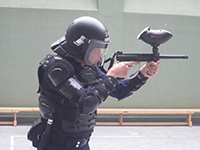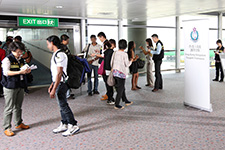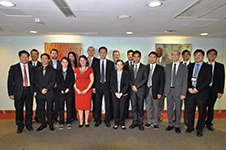Enforcement and Torture Claim Assessment Branch
Under the command of an Assistant Director, the Enforcement and Torture Claim Assessment Branch comprises the Enforcement Division and the Torture Claim Assessment Division. Each division is headed by a Principal Immigration Officer.
The Enforcement Division is responsible for formulating and implementing policies in respect of investigation, deportation and removal. The Torture Claim Assessment Division is responsible for handling torture claims made under Part VIIC of the Immigration Ordinance, matters relating to prosecution of immigration offenders and litigation cases relating to removal, deportation and torture claim. It is also responsible for the management of the Castle Peak Bay Immigration Centre for the detention of persons of 18 years old or above.
Investigation and Intelligence
The Immigration Department has made concerted efforts to uphold the laws of Hong Kong by investigating into offences under the Immigration Ordinance and the Registration of Persons Ordinance, and offences relating to the registration of births, deaths and marriages in Hong Kong; instituting removal and deportation proceedings against illegal immigrants and undesirables; and maintaining intelligence on global immigration matters.
Anti-Illegal Migration Agency
To further strengthen law enforcement actions against the use of forged travel documents and human smuggling activities at the Airport, the Department established an Airport Investigation Group (AIG) when the Hong Kong International Airport at Chek Lap Kok came into operation on 6 July 1998. AIG together with the Tactical Intelligence Group (TIG) were put under the management of the Anti-Illegal Migration Agency (AIM) since its formation on 28 June 2004. The main charter of AIM includes investigation of forgery and illegal migration cases intercepted at the Hong Kong International Airport, focused investigations on forgery syndicates relating to the abuse of HKSAR passports, and collection and analysis of the latest modus operandi of forgery syndicates and users.
Mainland Illegal Immigration
In 2013, the number of Mainland illegal immigrants intercepted was 952, representing a decrease of 26 per cent when compared with 1 286 arrested in 2012. Some of the illegal immigrants came to Hong Kong to take up unlawful employment while some came here to meet their families and relatives. The number of Mainland illegal immigrants involved in sex work decreased from 168 in 2012 to 48 in 2013. The number of surrendered pregnant Mainland illegal immigrants in 2012 was three, and there was no surrender case in 2013.
After the gazettal of the application procedures for the Certificate of Entitlement in July 1999, the number of surrendered minor illegal immigrants from the Mainland declined sharply. In 2012 and 2013, there was no surrender case encountered.
Unlawful Employment
In 2013, the Department continued to maintain high vigilance on the problem of illegal workers and actively took tough and effective enforcement actions against unlawful employment of illegal immigrants, visitors, foreign domestic helpers and imported workers who were subject to specific employment conditions so as to protect the local labour market. Measures taken included publication of related government policies and regulations, and frequent surprise checks on factories, restaurants, food production factories, shops, markets, foot reflexology centres, residential and commercial premises under renovation, cemeteries, refuse collection points and waste materials recycling factories, container depots and warehouses situated in the border and rural districts in the New Territories. In 2013, 6 052 illegal workers, including 3 829 persons engaged in sex work, were arrested, which represents an increase of 3.5 per cent as compared with 5 849 in 2012. Most of the illegal workers were prosecuted and fined or imprisoned before repatriation to their places of domicile. Besides, section 38AA of the Immigration Ordinance came into effect on 14 November 2009, which prohibits illegal immigrants or people who are subject of a removal order or deportation order from taking any employment, whether paid or unpaid, or from establishing or joining in any business. As at the end of 2013, 719 persons were arrested for being suspected of breaching the said Ordinance.
To combat offences relating to parallel trading activities, the Department has stepped up enforcement actions by mounting a series of anti-illegal worker operations codenamed 'Windsand' since September 2012. As at the end of 2013, a total of 77 operations were conducted with the apprehension of 1 065 Mainland visitors for breaching their conditions of stay by being involved in suspected parallel goods trading, and 12 local employers on suspicion of employing illegal workers. Among them, 142 Mainland visitors were convicted and sentenced to imprisonment ranging from four weeks to two months. According to the existing mechanism, the Department would pass the particulars of those Mainland visitors who had been convicted of illegal employment in Hong Kong to the Mainland authorities for cancellation of their exit endorsements and they would be prohibited from visiting Hong Kong for two years. For persons suspected of being involved in parallel goods trading but were not prosecuted, their future arrival would be closely scrutinised. They will be refused entry and repatriated to the Mainland if their purposes of visit are dubious.
To strengthen crime prevention measures and enforcement actions against illegal activities, including unlawful employment, an inter-departmental task force comprising the Immigration Department, Hong Kong Police Force, Customs and Excise Department, Labour Department, Correctional Services Department and Food and Environmental Hygiene Department was set up in April 2003.
Besides, for enhancing the effectiveness of curbing the problem of unlawful employment, the Department has set up an Anti-illegal Workers Combat Squad since January 2005 to provide a more speedy and robust combat force against illegal workers and their employers. The squad conducts plain-clothes patrol duties at black spots of illegal workers and takes speedy actions on reports of unlawful employment.
Employers of illegal workers were also prosecuted. In 2013, 269 employers were prosecuted for employing illegal workers. Many of the prosecuted employers were sentenced to jail. As a deterrent measure against unlawful employment, the Court of Appeal (CA) laid down a sentencing guideline in September 2004 reaffirming that employing a person not lawfully employable is a serious offence and the employer of an illegal worker should be sentenced to an immediate custodial sentence even for the first offence. The CA also stated that the presence of aggravating features, such as an element of exploitation, multiple employment of illegal workers or a repeated offence, will in most cases substantially increase the guideline sentence.
To prevent illegal workers from taking up renovation works in public and private housing estates, the Department issued guidelines to enhance proper record keeping of flats under renovation and the particulars of the flat owners, contractors and workers. Consequently, there is an obvious decrease in the number of illegal workers taking up renovation work in well-managed housing estates.
On the issue of illegal workers using or in possession of a forged or other person’s identity card, the CA handed down a sentencing guideline in March 2005. The Court found that for an offence of possession of a forged / other person’s identity card, even when the offender’s presence in Hong Kong is legal, the sentence should be 12 months’ imprisonment after a guilty plea. If the forged / other person’s identity card had been presented / used to conceal one’s status, so as to seek unlawful employment or to further one’s illegal stay in Hong Kong, the sentence should be 15 months’ imprisonment after a guilty plea.
Besides, apart from the Announcement in the Public Interest (API) on television to remind the public not to employ illegal workers, the Department has also launched an API on radio in Punti dialect, Putonghua and English to arouse public awareness of the serious consequences of employing holders of immigration recognizance forms for illegal employment. The API highlights the sentencing guideline and aims to disseminate the message to members of the public that employers of illegal workers will be given immediate custodial sentence.
The Department encourages members of the public to report immigration offences such as overstaying or employment of illegal workers by mail (address: 5/F, Skyline Tower, 39 Wang Kwong Road, Kowloon Bay, Kowloon), by calling the Department’s 24-hour hotline (2824 1551), by fax (2824 1166), by e-mail (anti_crime@immd.gov.hk) or by online reporting (www.gov.hk/orio). The Department will continue combating unlawful employment through various channels and appeals to members of the public not to employ illegal workers.
Immigration Task Force
Apart from conducting enforcement operations against immigration offenders, the Immigration Task Force also reinforces offices which require additional manpower resources to cope with the upsurge of workload. In 2013, 13 331 enforcement operations, including 484 large-scale joint operations with other government departments, were conducted. A total of 4 931 immigration offenders were arrested.
During the year, in order to curb the prevailing trend of unlawful employment, the Task Force also conducted a number of special operations codenamed 'Twilight', 'Champion' and 'Flabbergast' against illegal workers in various businesses. The Task Force will continue stepping up enforcement actions against illegal workers and their employers to protect job opportunities of the local workforce.
To step up publicity campaigns against the hiring of persons not lawfully employable and to raise public awareness of the serious consequences of unlawful employment, a special team and a propaganda vehicle are regularly deployed to station at black spots of illegal workers. On the other hand, the Department from time to time distributes ‘Don’t Employ Illegal Workers’ leaflets to store-keepers and disseminates the message in the talks or seminars organised by estate management companies, other government departments and public organisations.
Investigations into Forged Documents
The Department is extremely concerned about the use of forged travel documents, either for illegal migration, crimes or terrorism. Such illicit activities pose threat to immigration control and the security of the countries concerned and undermine the probity of the passports being forged. As syndicated forgery activity is a global problem, the Department works closely with the local, Mainland and overseas law enforcement agencies. Resolute actions are taken to detect the use of forged travel documents by travellers and illegal migrants who are in transit through Hong Kong to other countries. In 2013, anti-forgery operations conducted increased to 28 443 from 28 219 in 2012. As a result of the enhanced operations and full vigilance maintained by frontline staff at control points, the number of forged travel documents detected in 2013 was 765, representing an increase of 11 per cent as compared to 688 in 2012.
Since the issue of Hong Kong smart identity cards in June 2003, the Hong Kong smart identity card has become a target of forgery syndicates. In August 2013, the Department conducted an operation codenamed ‘Ringcracker’ and successfully neutralised a forgery syndicate which provided one-stop service to illegal workers. During the operation, 30 suspects were arrested while 35 forged Hong Kong identity cards and two Home Visit Permits were seized. In various operations conducted by the Department in 2013, a total of 65 forged Hong Kong smart identity cards were seized. To tackle the problem, the Department will continue to conduct various operations, intelligence collation and information exchange with relevant parties.
To achieve more effective results, the Department uses sophisticated equipment to assist in the detection of forged documents. Such equipment includes the Electronic Documentation of Information System on Networks (EDISON), which is a computerised system keeping a large collection of digitised colour images of genuine travel document specimens. The Department is also equipped with Video Spectral Comparators which are particularly effective in the immediate detection of forged and unlawfully altered documents.
The Department also makes use of compact hand-held forensic devices and forged document detectors to enable frontline officers to conduct quick examination of doubtful documents on the spot as well as the Face Recognition System (FACES) which is an effective ancillary tool in enhancing the detection of cases of multiple identities.
In addition, the Department uses advanced investigative analysis software and forensic system to assist in the investigation and for detail analysis of intelligence on forgery and human smuggling syndicate activities.
Operational Research
The Operational Research Section is responsible for collecting, analysing and disseminating information relating to matters of interest to the Department. It keeps track of the modus operandi of human smuggling and the trends on the use of forged travel documents.
The work of the section not only enables the provision of intelligence on immigration matters to the staff within the Department but also enhances the exchange of intelligence with other government bodies, consulates and counterparts of the Mainland and overseas.
During the year, workshops on the identification of forged travel documents and forged Hong Kong smart identity cards were conducted for our in-service officers, local and overseas enforcement agencies. Moreover, talks on security features of Hong Kong smart identity cards and techniques for identifying forged Hong Kong smart identity cards were delivered to personnel of other government departments, financial institutions and the legal sector who were regularly involved in the handling of identification documents.
The section also maintains an Enforcement Exhibition Gallery. The gallery highlights the diversity of work and various achievements of the Enforcement Division through the display of photographs, reports of enforcement actions, seized exhibits and various kinds of enforcement equipment. Besides, the gallery stores over 35 500 forgery items unearthed by the Department. These items include forged documents such as passports, identity cards, certificates and implements fit for forgery such as stamps and dies. Specimens are also displayed for training and exhibition purposes.
Prosecution, Deportation and Removal
In 2013, 5 532 charges were laid against persons who had committed offences under the Immigration Ordinance and the Registration of Persons Ordinance, and offences relating to the registration of births, deaths and marriages in Hong Kong. Under section 38AA of the Immigration Ordinance which came into effect on 14 November 2009, illegal immigrants or persons who are subject to a removal order or deportation order must not take any employment or establish or join any business. A person committing the offence is liable to a fine of $50,000 and to imprisonment for three years. As at the end of 2013, 638 offenders were prosecuted.
The Department also processes deportation and removal order applications to keep out undesirables. In 2013, 581 and 756 persons were deported and removed respectively from Hong Kong.
Ma Tau Kok Detention Centre
The Department’s detention centre at Ma Tau Kok has been operating since February 1998. The centre runs round-the-clock and can accommodate up to 87 detainees at any one time. In 2013, there were 17 143 immigration offenders admitted to the detention centre.
Castle Peak Bay Immigration Centre
The Castle Peak Bay Immigration Centre (CIC) is an immigration detention facility for detaining immigration offenders (18 years old or above) who are awaiting repatriation / removal / deportation in accordance with the Immigration Ordinance. In 2013, there were 7 536 detainees admitted to the CIC pending removal / deportation.
In view of different nature of work between managing the CIC and other immigration work, members of the Immigration Service responsible for the operation of the CIC have to receive necessary training in relation to the management of a detention centre. The training courses last for three weeks, including a one-week Detention Centre Management Course and a two-week tactical training. The Detention Centre Management Course focuses on the daily operation of a detention centre while the tactical training is concerned with staff’s response during riotous situation. As a requisite for the renewal of the exemption permit under the Firearms and Ammunition Ordinance by the Police Licensing Office, members of the Immigration Service are required to undergo refresher training organised by the CSD four times annually so that they are qualified to carry and use anti-riot equipment in the centre.
Torture Claim Assessment
The Convention against Torture and Other Cruel, Inhuman or Degrading Treatment or Punishment (the Convention against Torture) has been applied to Hong Kong since 1992. Pursuant to a Court of Final Appeal (CFA) judgment in a judicial review case in June 2004, the HKSAR Government has put in place an administrative screening mechanism for handling torture claims made under Article 3 of the Convention against Torture. Since then, there has been an upsurge in the number of torture claims made by persons coming mainly from South Asian and African countries. Inquiries revealed that most of these torture claimants lodged their torture claims only after they had been arrested for contravening the laws in Hong Kong, notified of their removal or rejected by the United Nations High Commissioner for Refugees (UNHCR) of their refugee claims.
In July 2012, the Legislative Council passed the Immigration (Amendment) Ordinance 2012 (the Ordinance) which provides the statutory provisions for processing torture claims. It came into operation on 3 December 2012. The Ordinance provides a statutory process for making and determining claims, including how a torture claim is made, the time limit for a claimant to return the torture claim form, the requirements for the Department to arrange screening interviews and issue written notices of decision, how a claimant who is aggrieved by the decision may lodge an appeal to be handled by a statutory Torture Claims Appeal Board, etc. For torture claimants who have failed to establish their claims, they will be removed from Hong Kong in accordance with the laws of Hong Kong. Torture claimants whose claims are established will not be removed to places where there are substantial grounds for believing that they will be in danger of being subjected to torture. However, removal to places where they may be admitted without the danger of being subjected to torture may be considered. Furthermore, if the torture risk giving rise to the claim has ceased to exist due to changes in circumstances of the claimant or the torture risk state, removal to that place may be considered.
In 2013, a total of 491 torture claim cases were received, decreasing by 58 per cent from 1 174 cases in 2012. The claimants mainly came from South or Southeast Asian countries. As at the end of 2013, the Department had processed 6 075 claims, of which around 90 per cent were provided with publicly funded legal assistance. Decisions were made on 4 534 claims, in which 12 of them were substantiated (including 2 claims that were substantiated by the Torture Claims Appeal Board after appeal) and 4 522 were determined as unsubstantiated. On the other hand, 3 758 claims were withdrawn and 2 792 claims were still under processing.
An unsuccessful torture claimant may lodge an appeal against the decision made by the Immigration Department to the Torture Claims Appeal Board (Appeal Board) within 14 days after written notice of the decision is given to him or her. The Appeal Board comprises a Chairperson, two Deputy Chairpersons and nine members as appointed by the Chief Executive. It may determine an appeal without a hearing if, having regard to the material before it and the nature of the issues raised, it is satisfied that the appeal can be justly determined without a hearing. As at the end of 2013, a total of 2 136 torture claim appeals were received. Among the 1 670 cases finalised (including 77 oral hearings conducted), 1 668 cases were refused and 2 cases were allowed. If a torture claimant is aggrieved by the refusal of his or her appeal, he or she may apply for judicial review to challenge the refusal decision.
Unified Screening Mechanism
Pursuant to the two Court of Final Appeal judgments - Ubamaka Edward Wilson v. Secretary for Security (FACV 15/2011) and C & Ors v. Director of Immigration (FACV 18-20/2011) handed down on 21 December 2012 and 25 March 2013 respectively, the Administration will introduce a unified screening mechanism (USM), which meets the ‘high standards of fairness’ required by the law, to determine claims for non-refoulement made in Hong Kong. Under the USM, the Immigration Department will assess claims for non-refoulement in respect of another country lodged by persons not having the right to enter and remain in Hong Kong on all applicable grounds including risk of torture as defined under Part VIIC of the Immigration Ordinance (Cap. 115, Laws of Hong Kong); risk of torture or cruel, inhuman or degrading treatment or punishment under Article 3 of the Hong Kong Bill of Rights; and / or risk of persecution with reference to the non-refoulement principle under Article 33 of the 1951 Convention relating to the Status of Refugees (Refugee Convention). The Administration is finalising the details of its operation with relevant stakeholders, including the Duty Lawyer Service with a view to commencing the USM in the first quarter of 2014. This does not affect the Administration’s position that the Refugee Convention and its 1967 Protocol have never been applied to Hong Kong and our firm policy of not granting asylum to anyone.
Combating Mainland Pregnant Women Coming to Hong Kong for Confinement by Illegal Means
The Department is committed to combating Mainland pregnant women giving birth in Hong Kong through illicit means. In 2013, the Department prosecuted 94 Mainland women who had overstayed to give birth in Hong Kong and 8 Mainland pregnant women who gave birth in Hong Kong through illicit means. They were all convicted and sentenced up to 15 months’ imprisonment.
To tie in with the implementation of ‘zero-quota’ policy promulgated by the HKSAR Government in 2013, the Department has set up a special task unit since November 2012 to collect relevant data from private hospitals for analysis so as to combat cases of obtaining ‘Confirmation Certificate on Delivery Booking’ for delivery in Hong Kong by means of bogus marriage. As at the end of 2013, a total of 130 doubtful cases were detected from about 7 500 delivery bookings with 15 persons being successfully prosecuted, which included three Mainland pregnant women, eight Hong Kong resident husbands and four intermediaries.
To crack down on illegal hostels for Mainland pregnant women, the Department has worked closely with the Hong Kong Police Force and the Office of the Licensing Authority of the Home Affairs Department in exchanging intelligence and conducting joint operations since February 2012. In 2013, over 40 joint operations were conducted to inspect unlicensed guesthouses to deter non-local pregnant women from entering Hong Kong early in order to evade immigration examination.
Combating Illegal Migration and Human Smuggling
Hong Kong is a metropolitan city and an international traffic hub. Forgery facilitators and illegal migrants tend to make use of Hong Kong’s extensive and convenient transportation network as a transit point to seek entry overseas. The Department undertakes an active role in combating illegal activities and contributes in containing and preventing illegal migration from dispersion as well as preventing Hong Kong from being used as a springboard for human smuggling activities. The Special Investigation Section, formed in early 1980s, is specialised in the investigation of organised immigration offences, including human smuggling activities, occurring in or involving Hong Kong. It works closely with other law enforcement agencies in Hong Kong, the Mainland and overseas with the mutual aim to combat organised human smuggling activities.
The Department, from time to time, conducts interdiction exercises at the Hong Kong International Airport to apprehend forged travel document users and forgery syndicate members. The exercises include operations on arrival and departure flights, spot checks of travel documents of arriving and departing passengers inside the transit lounge, at boarding gates and the SkyPier as well as observation operations. During the thematic interdiction exercises carried out in July 2013, around 490 departure / arrival flights and arrival ferries from the SkyPier together with over 580 passengers were spot-checked.
In January 2013, the Department conducted a joint operation codenamed ‘Sandstorm’ with the Organised Crime and Triad Bureau (OCTB) of the Hong Kong Police Force against human smuggling activities at the Hong Kong International Airport. One Hong Kong escort and three Mainland residents holding false visas were arrested in the operation, and were sentenced to imprisonment ranging from 22 to 26 months. In March 2013, a joint operation codenamed ‘Bowstring’ was conducted in Guangdong Province and Hong Kong by the Department, the Guangdong Provincial Public Security Department and the Shenzhen Municipal Public Security Bureau. The operation neutralised an active human smuggling syndicate and resulted in the arrest of 15 suspects, including core syndicate members and HKSAR passport sellers.
Besides, the Department is very concerned with the illegal entries of nationals of South Asian and African countries from the Mainland. In order to combat the problem, close liaison and intelligence exchange are maintained with the Hong Kong Police Force and the Mainland authorities for joint efforts in combating these illicit activities.
The Operational Research Section and Tactical Intelligence Group of Anti-Illegal Migration Agency closely monitor the latest trends on illegal migration as well as the modus operandi adopted by human smuggling syndicates. They maintain close liaison with the local, Mainland and overseas authorities and representatives of foreign counterparts on the exchange of relevant intelligence and trends. Frontline officers would be alerted whenever new trends on forged travel documents and illegal migration are observed.
Combating Bogus Marriages
The Department has grave concerns about non-Hong Kong residents obtaining stay in Hong Kong by means of bogus marriages. These people contracted bogus marriages with Hong Kong residents in order to gain entry into Hong Kong and eventually for settlement.
On 18 December 2006, the Department set up a special task force to collate intelligence through various sources and to conduct thorough investigation with a view to taking prosecution actions against offenders.
To further combat bogus marriage cases, the Marriage Registries of our Department have stepped up checking on suspected cases, while the Investigation Sub-division has also initiated investigation into any suspected bogus marriages. With these measures in place, a number of suspected cases were swiftly detected and the persons involved were convicted of relevant offences.
In 2013, a total of 188 persons, including the bogus couples and syndicate members, were prosecuted for offences relating to bogus marriages. Persons convicted of such offences were sentenced to imprisonment ranging from 4 to 48 months.
For persons who have obtained their residence in Hong Kong by fraudulent means, their Hong Kong identity cards and residence status will be invalidated according to the laws of Hong Kong. They will also be subject to removal to their places of origin.
Exchange of Intelligence
In the fight against illegal migration, exchange of information and intelligence on global human smuggling activities and forgery trends is of utmost importance. The Department discusses issues on illegal migration, crimes and terrorism through frequent and regular meetings with major local consular missions. In 2013, the Department actively participated in international and regional conferences and seminars, e.g. representatives from the Department attended the ‘5th Bali Process Regional Ministerial Conference cum the Senior Officials’ Meeting’ held in Bali, Indonesia and the ‘8th Symposium on Police Studies of the Strait cum Hong Kong and Macao on Reflection and Vision on the Mechanism for Cross-boundary Police Co-operation’ held in Taiwan. The Department has successfully established an effective communication network as well as working relationship with foreign and Mainland counterparts in facilitating exchange of intelligence and proactive actions in combating illegal migration activities. Useful intelligence that may help detecting, disrupting or suppressing illegal migration activities is promptly disseminated through the established mechanism.


